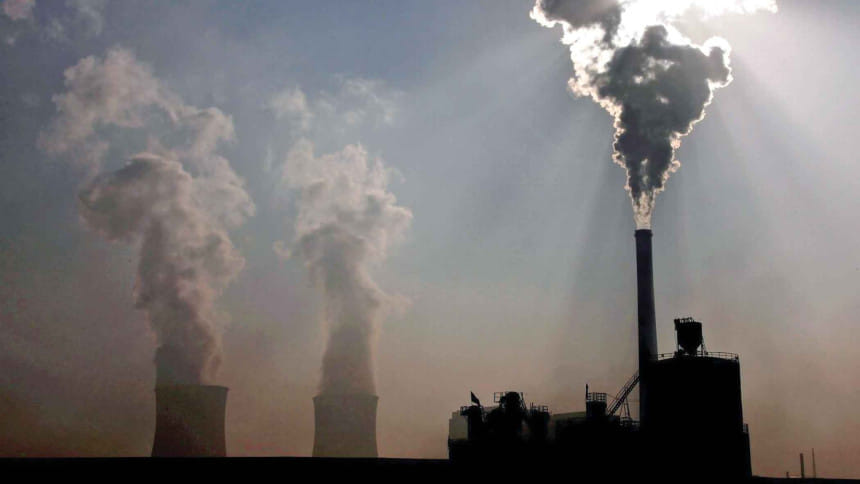Asia needs bold action on climate change

As the Asia-Pacific region confronts and recovers from the Covid-19 pandemic, we must continue our pursuit of sustainable development and take action on global climate change, the existential challenge of our time.
Our region must take its place at the front lines of this effort. The region, which now accounts for 36 percent of global GDP, has made great progress in economic development and poverty reduction. But it is also responsible for around 80 percent of the world's coal consumption, and up to 60 percent of CO2 emissions. Many countries have experienced the devastating consequences of climate change: floods, droughts, heat waves, and storms.
Now is the time for bold action. We must commit wholeheartedly to fighting climate change, including meeting the emission-reduction goals under the Paris Agreement, all the while promoting economic growth and putting the region's development on a green path.
This will require major changes in the energy sector. These include: avoiding the use of fossil fuels and switching to low-carbon fuels, deploying more renewable energy, improving energy efficiency, reducing final energy demand, and incentivising investment in low-carbon technologies.
A broad commitment across the region, along with tailored, country-level support from development partners, will be needed to meet the goal of limiting global warming to no more than 2 degrees above pre-industrial levels.
We need to get back on the path to low-carbon sustainable development. We have to balance climate mitigation and adaptation efforts. And we must ensure universal energy access, as more than 200 million people in the region still have no electricity.
In spite of the current situation, there is a path to addressing these challenges successfully.
Global action to achieve net zero emissions by around mid-century has gained momentum over the past year. Among the countries that have pledged carbon neutrality are China, Fiji, Japan, South Korea, Maldives, the Marshall Islands, Singapore, and Timor-Leste.
This November, the 26th Conference of the Parties (COP26) will convene in Glasgow. More countries are expected to submit more ambitious nationally determined contributions (NDCs) and to signify their commitment to carbon neutrality.
The Asian Development Bank (ADB) is ready to take on a leadership role in Asia and the Pacific in meeting these commitments. We aim at stepping up our climate finance and capacity-building efforts to help our developing member countries (DMCs) achieve their NDCs.
Under our Strategy 2030, our target is to focus 75 percent of ADB's operations on climate adaptation and mitigation. We will also provide at least USD 80 billion in climate financing from 2019 to 2030, which means on average about USD 6.6 billion annually. This year, we are confident that we will be able to provide over USD 6 billion for climate mitigation and adaptation through measures including investing in clean energy.
ADB will contribute to the global effort envisioned by COP26 on multiple fronts. We will promote greater collaboration and cooperation; balanced climate mitigation and adaptation efforts; and a holistic approach that integrates the ecological, social, and financial aspects of resilience across our operations. We are aligning our operations to support the targets of the Paris Agreement.
We will also continue to utilise our private-sector operations to support this agenda. Private-sector finance will be pivotal to filling investment gaps and spearheading technological and business innovation in the pursuit of sustainable solutions.
The energy transition requires comprehensive long-term planning combined with effective innovations. ADB is committed to helping our DMCs formulate and implement technology roadmaps to achieve their NDCs.
Our support is taking full advantage of major technological advances that have slashed the costs of producing renewable energy—by up to 80 percent in the case of solar photovoltaics. Emerging technologies like smart grids, energy storage, and hydrogen are making it easier to integrate renewable energy into power networks and distributed energy systems. Smart technologies have enhanced the flexibility and resilience of power networks. Digitalisation has boosted energy efficiencies on the demand side.
Innovative energy projects are leveraging the synergy between the public and private sectors and having cross-sectoral impacts. In Thailand, for example, ADB provided long-term financing for a 10-megawatt wind power project with an integrated 1.88 megawatt-hour pilot battery energy storage system. It is the first private-sector project in the country to integrate utility-scale wind power generation with battery energy storage.
In Mongolia, our USD 100 million loan for the first utility-scale energy storage project in the country will increase renewable energy use by providing a large energy reserve, load shifting capacity, and emergency back-up. This will support decarbonisation of Mongolia's heavily coal-dependent energy system.
We are now reviewing ADB's Energy Policy in light of the profound changes in the energy landscape. We have been consulting stakeholders since last year and plan to update our Energy Policy by the end of 2021.
We envision an Energy Policy that is aligned with global commitments under the Paris Agreement. A policy that is responsive to the needs of our DMCs as they build sustainable and resilient energy systems. And, while the final decision will have to be made by our Board, a policy that includes a formal withdrawal from financing new coal-fired power generation.
Masatsugu Asakawa is President of the Asian Development Bank (ADB).

 For all latest news, follow The Daily Star's Google News channel.
For all latest news, follow The Daily Star's Google News channel. 



Comments